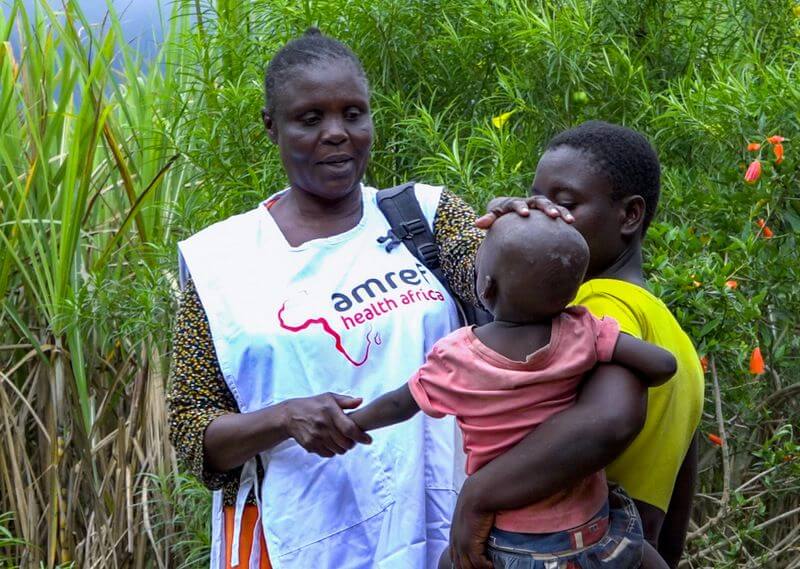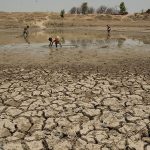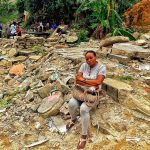In Buhuma Village, Busia County, Western Kenya, villagers know that the person to call when children get ill is Jacinta Rabura. She may not be a doctor, but she handles around ten malaria cases a day, amongst other illnesses and emergencies.
“Just recently, I received a distress call from a group of children when one of their siblings fell ill when their parents were away. I took the child, arranged for a motorbike, and personally transported them to the hospital until the parents arrived. This is just part of my daily life,” Rabura explained, adding that “I only handle mild cases, but for severe ones, I refer them or take them to a health facility.”
As a community health volunteer, Rabura is the go-to person regarding all things health-related in her village.
“Some families even invite me into their homes to teach them how to use a mosquito net properly. I also educate them about the signs and symptoms of malaria to watch out for,” she said.
Besides dealing with illnesses like malaria, she also educates mothers on proper nutrition, particularly for children under five, to reduce malnutrition and prevent frequent illnesses.
Also in Western Kenya, Rose Atieno, a community health volunteer, works under Youth Fighting against HIV/Aids in Kenya (YOFAK), a non-governmental organisation that supplies them with HIV testing kits.
She always carries these kits with her, ready to respond to calls for assistance. Sometimes, community members arrange for a motorbike to transport her to households requiring her services. She does follow-ups on her patients as well.
In Kenya, community health volunteers are essential frontline workers whose services include health education, referrals and preventive measures. Duties include making home visits, delivering health promotion messages, treating common illnesses, and establishing protocols for community-based maternal and newborn health.
Each volunteer is assigned approximately 100-500 individuals, with monthly visits to households in a defined geographical area called a Community Health Unit.
Their relentless efforts have seen a significant improvement in rural health, with a reduction in malaria cases from eight per cent to six per cent in the last five years alone, according to the Ministry of Health.
“The uptake of community health services has significantly improved antenatal care visits, deliveries attended by skilled birth attendants, HIV testing during pregnancy, intermittent preventive treatment for malaria during pregnancy, exclusive breastfeeding during the first six months of life, and childhood immunisation coverage,” said Health Cabinet Secretary, Susan Nakhumicha.
Brigid Akinyi Wabwire, a mother of four, constantly fears malaria affecting her youngest daughter.
Whenever her daughter’s temperature rises, her first reaction is to contact Rabura to evaluate the situation.
“Even at night, Rabura responds promptly and attends to us. She checks the baby’s temperature, conducts Malaria tests, and administers the necessary medication if the results are positive,” Akinyi explained.
“If the child’s condition worsens, she refers us to Igozo or Igula dispensaries hospital for further treatment. Our only challenge arises when she doesn’t have the required medication, and we must procure it ourselves,” added Akinyi.
Rabura is often forced to dig into her pocket to facilitate her community in accessing treatment. This is despite her not receiving any compensation for her work.
“I willingly offer my assistance to my people, despite the challenges, as we don’t receive any direct benefits,” she said.
In the nearby village of Busakade, Evaline Onyango recounts her three-year-old son’s illness from malaria.
“He began vomiting one evening. The nearby dispensary had already closed. So I sought help from the community health volunteer, who diagnosed my son with malaria. She provided me with tablets and instructed me on when and how to administer them. She even taught me preventive measures against malaria,” Onyango shared.
Rabura and Atieno share similar experiences.
“Sometimes, I encounter clients who are malaria positive but cannot afford even basic painkillers. I end up using my own money to purchase the medication, as I cannot provide them with Anti-Malarial drugs without pain relief,” said Atieno.
Furthermore, Atieno notes that some families are reluctant to have their children vaccinated. If she fails to convince them, she always seeks the assistance of the local chief to engage with the families.
While some community health volunteers receive stipends from the county and national governments and non-governmental organisations they collaborate with, ranging from Ksh2,000 (U$15) to Ksh7000 (U$50) monthly, some volunteers do not receive any pay.
While the efforts of these frontline responders has largely gone unheralded, recent efforts suggest that things are beginning to change.
The country’s president, William Ruto, has acknowledged the vital role the community health promoters play, announcing that community health volunteers would now be referred to as community health promoters.
According to Health Cabinet Secretary Susan Nakhumicha, the change will come with more government support.
“We are shifting the focus from curative to promotive and preventive services. These promoters have been assigned to specific households within their communities, the government will be providing them with necessary tools and financing for their duties,” said Nakhumicha
A new bill is currently before the senate that seeks to compel the county governments to recruit and retain community health workers with permanent and pensionable jobs.
bird story agency
In Buhuma Village, Western Kenya, Jacinta Rabura, a community health volunteer, is a key figure in managing health issues, particularly malaria, among villagers. She not only treats mild cases and refers severe ones to hospitals but also educates families on using mosquito nets and recognizing malaria symptoms. Rabura's dedication includes arranging transport for emergencies and providing nutritional advice to combat child malnutrition, despite receiving no compensation.
Similarly, Rose Atieno, another community health volunteer working with YOFAK, provides HIV testing and follows up on patients, sometimes using her funds to buy necessary medications. These volunteers play a crucial role in rural health improvement, significantly lowering malaria rates and increasing health service uptake such as antenatal care and childhood immunization.
The importance of these volunteers has been increasingly recognized, with President William Ruto renaming them as community health promoters and promising more government support. Legislation is in progress to ensure they have permanent, pensionable positions, emphasizing a shift towards preventive and promotive health services in Kenyan communities.






